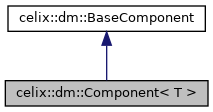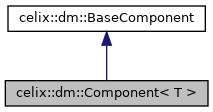#include <Component.h>


Public Member Functions | |
| ~Component () override | |
| bool | isValid () const |
| T & | getInstance () |
| Component< T > & | setInstance (std::shared_ptr< T > inst) |
| Component< T > & | setInstance (std::unique_ptr< T > &&inst) |
| Component< T > & | setInstance (T &&inst) |
| template<class I > | |
| Component< T > & | addInterfaceWithName (const std::string &serviceName, const std::string &version=std::string{}, const Properties &properties=Properties{}) |
| template<class I > | |
| Component< T > & | addInterface (const std::string &version=std::string{}, const Properties &properties=Properties{}) |
| template<class I > | |
| Component< T > & | addCInterface (I *svc, const std::string &serviceName, const std::string &version=std::string{}, const Properties &properties=Properties{}) |
| template<class I > | |
| ProvidedService< T, I > & | createProvidedCService (I *svc, std::string serviceName) |
| Creates a provided C services the component. More... | |
| template<class I > | |
| ProvidedService< T, I > & | createProvidedService (std::string serviceName={}) |
| Creates a provided C++ services for the component. More... | |
| template<class I > | |
| ProvidedService< T, I > & | createUnassociatedProvidedService (std::shared_ptr< I > svc, std::string serviceName={}) |
| Creates a unassociated provided services for the component. More... | |
| template<class I > | |
| Component< T > & | removeCInterface (const I *svc) |
| template<class I > | |
| ServiceDependency< T, I > & | createServiceDependency (const std::string &name=std::string{}) |
| template<class I > | |
| Component< T > & | remove (ServiceDependency< T, I > &dep) |
| template<typename I > | |
| CServiceDependency< T, I > & | createCServiceDependency (const std::string &name) |
| template<typename I > | |
| Component< T > & | remove (CServiceDependency< T, I > &dep) |
| Component< T > & | setCallbacks (void(T::*init)(), void(T::*start)(), void(T::*stop)(), void(T::*deinit)()) |
| Component< T > & | setCallbacks (int(T::*init)(), int(T::*start)(), int(T::*stop)(), int(T::*deinit)()) |
| Component< T > & | removeCallbacks () |
| Component< T > & | addContext (std::shared_ptr< void >) |
| Add context to the component. This can be used to ensure a object lifespan at least matches that of the component. More... | |
| Component< T > & | build () |
| Component< T > & | buildAsync () |
 Public Member Functions inherited from celix::dm::BaseComponent Public Member Functions inherited from celix::dm::BaseComponent | |
| BaseComponent (celix_bundle_context_t *con, celix_dependency_manager_t *cdm, std::string name, std::string uuid) | |
| virtual | ~BaseComponent () noexcept |
| BaseComponent (const BaseComponent &)=delete | |
| BaseComponent & | operator= (const BaseComponent &)=delete |
| celix_dm_component_t * | cComponent () const |
| celix_bundle_context_t * | bundleContext () const |
| const std::string & | getUUID () const |
| const std::string & | getName () const |
| ComponentState | getState () const |
| void | wait () const |
| void | runBuild () |
Static Public Member Functions | |
| static std::shared_ptr< Component< T > > | create (celix_bundle_context_t *, celix_dependency_manager_t *cDepMan, std::string name, std::string uuid) |
Additional Inherited Members | |
 Protected Attributes inherited from celix::dm::BaseComponent Protected Attributes inherited from celix::dm::BaseComponent | |
| celix_bundle_context_t * | context |
| celix_dependency_manager_t * | cDepMan |
| celix_dm_component_t * | cCmp |
| std::string | cmpUUID {} |
| std::string | cmpName {} |
| std::atomic< bool > | cmpAddedToDepMan {false} |
| std::mutex | mutex {} |
| std::vector< std::shared_ptr< BaseServiceDependency > > | dependencies {} |
| std::vector< std::shared_ptr< BaseProvidedService > > | providedServices {} |
| std::vector< std::shared_ptr< void > > | componentContexts {} |
Constructor & Destructor Documentation
◆ ~Component()
|
overridedefault |
Member Function Documentation
◆ addCInterface()
| Component< T > & Component::addCInterface | ( | I * | svc, |
| const std::string & | serviceName, | ||
| const std::string & | version = std::string{}, |
||
| const Properties & | properties = Properties{} |
||
| ) |
Adds a C interface to provide as service to the Celix framework.
- Parameters
-
svc The service struct serviceName The service name to use version The version of the interface (e.g. "1.0.0"), can be an empty string properties To (meta) properties to provide with the service
◆ addContext()
| Component< T > & Component::addContext | ( | std::shared_ptr< void > | context | ) |
Add context to the component. This can be used to ensure a object lifespan at least matches that of the component.
◆ addInterface()
| Component< T > & Component::addInterface | ( | const std::string & | version = std::string{}, |
| const Properties & | properties = Properties{} |
||
| ) |
Adds a C++ interface to provide as service to the Celix framework.
- Parameters
-
serviceName The service name to use version The version of the interface (e.g. "1.0.0"), can be an empty string properties To (meta) properties to provide with the service
- Returns
- the DM Component reference for chaining (fluent API)
◆ addInterfaceWithName()
| Component< T > & Component::addInterfaceWithName | ( | const std::string & | serviceName, |
| const std::string & | version = std::string{}, |
||
| const Properties & | properties = Properties{} |
||
| ) |
Adds a C++ interface to provide as service to the Celix framework.
- Parameters
-
serviceName The service name to use version The version of the interface (e.g. "1.0.0"), can be an empty string properties To (meta) properties to provide with the service
- Returns
- the DM Component reference for chaining (fluent API)
◆ build()
| Component< T > & Component::build |
Build the component.
When building the component all provided services and services dependencies are enabled. This is not done automatically so that user can first construct component with their provided service and service dependencies.
Note that the after this call the component will be created and if the component can be started, it will be started and the services will be registered.
Should not be called from the Celix event thread.
◆ buildAsync()
| Component< T > & Component::buildAsync |
Same as build, but this call will not wait til all service registrations and tracker are registered/openend on the Celix event thread. Can be called on the Celix event thread.
◆ create()
|
static |
◆ createCServiceDependency()
| CServiceDependency< T, I > & Component::createCServiceDependency | ( | const std::string & | name | ) |
Adds a C service dependency to the component
- Returns
- the DM Component reference for chaining (fluent API)
◆ createProvidedCService()
| ProvidedService< T, I > & Component::createProvidedCService | ( | I * | svc, |
| std::string | serviceName | ||
| ) |
Creates a provided C services the component.
The provided service can be fine tuned and build using a fluent API
- Parameters
-
svc The pointer to a C service (c struct) serviceName The service name to use
◆ createProvidedService()
| ProvidedService< T, I > & Component::createProvidedService | ( | std::string | serviceName = {} | ) |
Creates a provided C++ services for the component.
The provided service can be fine tuned and build using a fluent API
- Note
- The service type I must be a base of component type T.
- Parameters
-
serviceName The optional service name. If not provided the service name is inferred from I.
◆ createServiceDependency()
| ServiceDependency< T, I > & Component::createServiceDependency | ( | const std::string & | name = std::string{} | ) |
Creates and adds a C++ service dependency to the component
- Returns
- the Service Dependency reference for chaining (fluent API)
◆ createUnassociatedProvidedService()
| ProvidedService< T, I > & Component::createUnassociatedProvidedService | ( | std::shared_ptr< I > | svc, |
| std::string | serviceName = {} |
||
| ) |
Creates a unassociated provided services for the component.
The provided service can be fine tuned and build using a fluent API
- Note
- The provided service can - and is expected to be - be unassociated with the component type. I.e. it can be a C service. The ProvidedService result will store the shared_ptr of the service during its lifecycle.
- Parameters
-
serviceName The optional service name. If not provided the service name is inferred from I.
◆ getInstance()
| T & Component::getInstance |
Get the component instance. If no instance is explicitly set with setInstance than a instance will be create using a default constructor.
- Returns
- A reference to the component instance.
◆ isValid()
| bool Component::isValid |
Whether the component is valid. Invalid component can occurs when no new components can be created and exceptions are not allowed.
- Returns
◆ remove() [1/2]
| Component< T > & Component::remove | ( | CServiceDependency< T, I > & | dep | ) |
Removes a C service dependency to the component
- Returns
- the DM Component reference for chaining (fluent API)
◆ remove() [2/2]
| Component< T > & Component::remove | ( | ServiceDependency< T, I > & | dep | ) |
Removes a C++ service dependency from the component
- Returns
- the DM Component reference for chaining (fluent API)
◆ removeCallbacks()
| Component< T > & Component::removeCallbacks |
Remove the previously registered callbacks for the component life cycle control
- Returns
- the DM Component reference for chaining (fluent API)
◆ removeCInterface()
Adds a C interface to provide as service to the Celix framework.
- Parameters
-
svc The service struct serviceName The service name to use version The version of the interface (e.g. "1.0.0"), can be an empty string properties To (meta) properties to provide with the service
◆ setCallbacks() [1/2]
| Component< T > & Component::setCallbacks | ( | int(T::*)() | init, |
| int(T::*)() | start, | ||
| int(T::*)() | stop, | ||
| int(T::*)() | deinit | ||
| ) |
Set the callback for the component life cycle control with a int return to indicate an error.
- Parameters
-
init The init callback. start The start callback. stop The stop callback. deinit The deinit callback.
- Returns
- the DM Component reference for chaining (fluent API)
◆ setCallbacks() [2/2]
| Component< T > & Component::setCallbacks | ( | void(T::*)() | init, |
| void(T::*)() | start, | ||
| void(T::*)() | stop, | ||
| void(T::*)() | deinit | ||
| ) |
Set the callback for the component life cycle control
- Parameters
-
init The init callback. start The start callback. stop The stop callback. deinit The deinit callback.
- Returns
- the DM Component reference for chaining (fluent API)
◆ setInstance() [1/3]
| Component< T > & Component::setInstance | ( | std::shared_ptr< T > | inst | ) |
Set the component instance using a shared pointer.
- Returns
- the DM Component reference for chaining (fluent API)
◆ setInstance() [2/3]
| Component< T > & Component::setInstance | ( | std::unique_ptr< T > && | inst | ) |
Set the component instance using a unique pointer.
- Returns
- the DM Component reference for chaining (fluent API)
◆ setInstance() [3/3]
| Component< T > & Component::setInstance | ( | T && | inst | ) |
The documentation for this class was generated from the following files:
- libs/framework/include/celix/dm/Component.h
- libs/framework/include/celix/dm/Component_Impl.h
 1.8.17
1.8.17